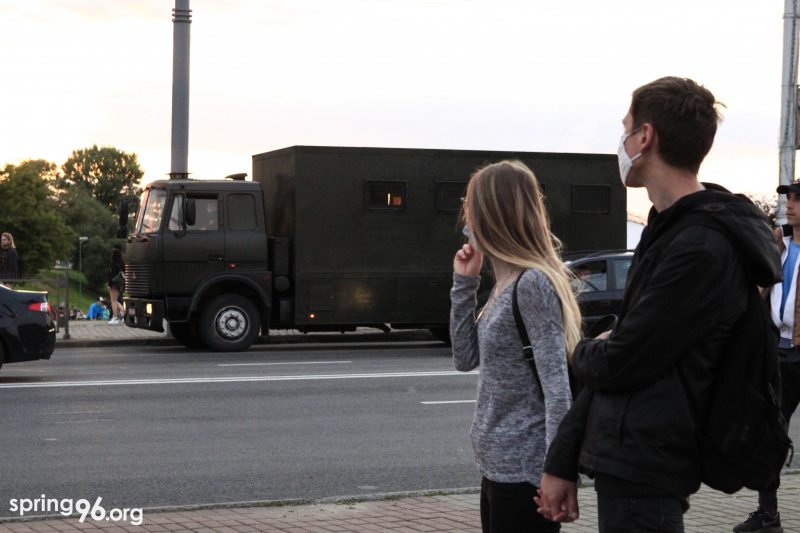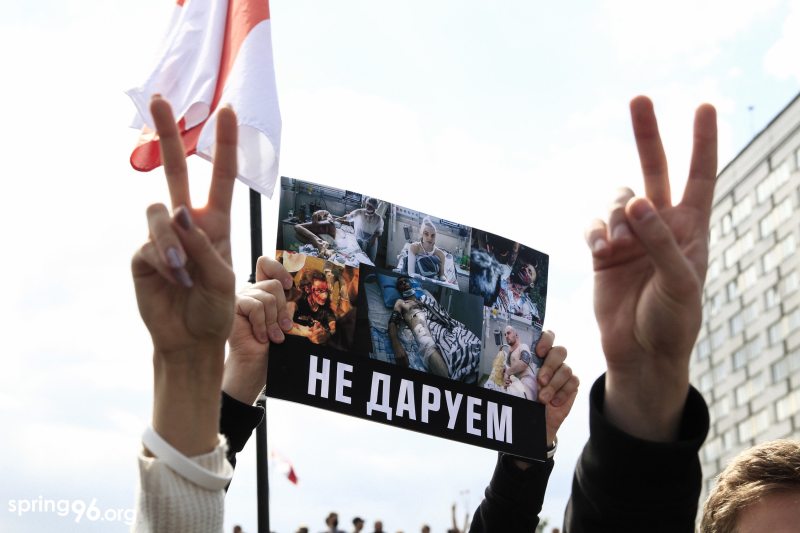"We are restoring justice." Human rights activists explained their large statement on giving the status of "former political prisoners"
On September 18, the human rights community of Belarus made a large statement which demanded the full rehabilitation of 150 people convicted of participating in post-election peaceful protests under Article 342 of the Criminal Code. For various reasons, these people did not have the status of political prisoners during their imprisonment, but despite this, in the statement human rights activists give them the status of "former political prisoners". Why is necessary to add repressed people to the list of former political prisoners now? What is the recognition procedure and who can apply to human rights defenders? Why is this important, both for the people who have been persecuted, and for the entire Belarusian society? These and other questions are answered by Viasna human rights defenders Nasta Vasilchuk and Pavel Sapelka.
"Every month there will be more and more released people whose political persecution we did not know about"
According to Nasta Vasilchuk, people who were not recognized as political prisoners at the time, but were in places of incarceration for political reasons, began to contact Viasna Human Rights Center more and more often. The human rights activist said that their relatives did not report about their detention and that was the main reason why such a status had not been given to them. Now these people are turning to human rights defenders and asking them to be included in the lists of the repressed so that the fact of their persecution is officially recorded.
"At the moment, these are mainly those who served several months before the trial in a pre-trial detention center under the “people's article" 342, and then were released, sentenced to the restriction of freedom in an open penal facility or home confinement. Also, people who have fully served their sentences in a penal colony for political articles and are now safe, but whom we were not previously aware of, began to get in touch. So far, these are isolated cases, but we are sure that every month there will be more and more people released after serving their sentences, whose political persecution we did not know about.
The main reason why people do not report their loved ones imprisoned for political reasons is the fear of even greater repression against the prisoners, as well as against themselves. And although we always say that silencing repressions will not save an already detained person, and that even in the current situation there are ways to safely transmit information to human rights defenders, we are fully aware that if the situation in Belarus remains as it is, there will be a significant number of people who will not tell anyone about repressions against their loved ones. Taking all this into account, and also understanding that all these people we did not know about before in fact did not differ in any way, at the time of their imprisonment, from political prisoners we recognized because we knew of them, we decided to make special statements on them, where we officially affirm their status of former political prisoners," Nasta says.
She notes that human rights defenders plan to accept two types of statements regarding former political prisoners:
"The first type is similar to our first statement on those who were imprisoned under Article 342 of the Criminal Code. It demands the full rehabilitation of these people. The second type has a demand for a review of sentences. If we talk about articles, then these are the already mentioned "people's article" 342 of the Criminal Code, defamatory articles (if a person was placed in a pre-trial detention center or served time in home confinement or in a colony for insulting Lukashenka, officials, police officers (Articles 368, 369, 367, 130 of the Criminal Code, etc.), as well as articles related to "extremist" activities (participation in "extremist formation", donations, transfer of information to “extremist formations” (Articles 361-1, 361-2, 361-4 of the Criminal Code)). These may be other articles that have been used for the purposes of political persecution of a person."
"We insist on rehabilitation and expand opportunities of the former political prisoners to receive support from the public"
Pavel Sapelka notes that with these and subsequent statements, human rights defenders emphasize that none of the victims of politically motivated criminal prosecution should be forgotten.
"There may be many reasons why people were not recognized as political prisoners at the time when they were deprived of their freedom, which are based on the desperate efforts of the authorities in trying to keep secret the scale and nature of politically motivated repressions. The shameful people who seized power in Belarus have done a lot to make Belarusians freeze in fear for their freedom, privacy, life, and health. However, realizing the lawless nature of criminal prosecution for the exercise of the constitutional and internationally recognized rights, the authorities in general and each specific criminal in uniform or in a mantle in particular hide the truth about repression and force us to forget it and replace it with an artificial reality from propagandists.
By stating the fact that people were criminally prosecuted and deprived of their liberty for political reasons, we restore justice in the approaches to various life situations of people who peacefully defended and exercised their rights. We insist on the right of these citizens to rehabilitation, and in addition, we expand opportunities for them to receive support from the public and civil society institutions and the protection of democratic governments, remind our own state of its obligations in the field of human rights, and record facts and assessments for the future. These assessments are based on our values and ideals, which remain indestructible and unshakable."
Human rights defenders call people to safely report everything that is known about all types of repression in Belarus, offer all their opportunities to support victims of torture, other prohibited forms of treatment, persecution, and imprisonment for political reasons.
What is necessary to include a person in the list of former political prisoners?
In order for information about a person to be included in the list of former political prisoners, they or their relatives need to contact Viasna (@ViasnaSOS, @Viasnainfo) and report their case. Nasta Vasilchuk explained the procedure for adding a person to the list of former political prisoners in more detail:
"It is necessary to send at least some documents concerning the case of a person and which have the records that during a certain period this person was in a place of incarceration. For example, if a person was held in a pre-trial detention center before the trial, this will be indicated in the text of the sentence. After all, if human rights defenders had absolutely no information about a person before they were contacted, then in our decision to add them to the list of former political prisoners, we must rely not only on the words of the person, but also on documents. Then, after being contacted, human rights defenders consider the case of a person and decide on giving the status of a "former political prisoner". After that, a corresponding statement is made and the profile of the former prisoner will appear on the Viasna website in the section of former political prisoners."

We demand the rehabilitation of convicted participants of peaceful assemblies


















